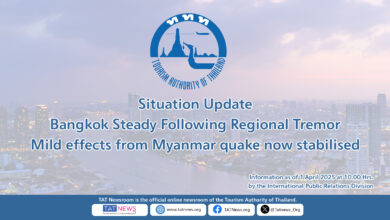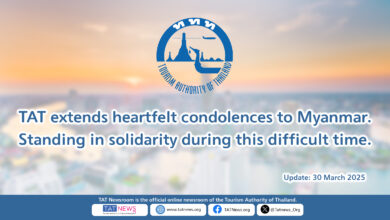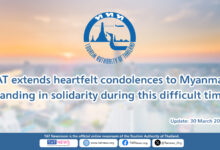Bangkok, 20 February, 2020 – The Tourism Authority of Thailand (TAT) would like to provide recommendations regarding the Coronavirus Disease 2019 (COVID-19) control measures for tourism-related establishments and services.
TAT encourages all in the Thai tourism industry to be a part of the nationwide effective implementation on disease surveillance to prevent further spread or importation of the COVID-19 in the country.
Tour companies
- Screening protocol – Inform group tour members about Thailand’s COVID-19 surveillance measures at international points of entry for passengers from the affected areas before arriving in Thailand (see list of affected areas: https://ddc.moph.go.th/viralpneumonia/eng/index.php).
- Travel insurance – Recommend group tour members to purchase a travel health insurance plan, especially for people with a travel history to the affected areas in the previous 14 days.
- Knowledge sharing – Inform group tour members, tour guides and tour leaders about the COVID-19, risk areas, transmission and symptoms. Provide surgical masks, alcohol gel and recommendations for healthcare. If a tourist is sick, tour guides should immediately take the tourist to the nearest hospital.
- Cleanliness – Pay extra attention to the cleanliness of the vehicles used for tours and transporting tourists. Cleaning staff should focus especially on parts that are often used or touched by passengers, e.g., seating, vehicle seat cases, armrests, curtains, blankets and mirrors/windows, as well as air conditioning systems and restrooms on the buses (if applicable). Use detergent or disinfectant and 70% alcohol solution to decrease the risk of contamination and spread of infection.
Accommodation (hotels, resorts, guesthouses, homestays, etc.)
- Screening – Reception staff should inquire about the guests’ travel history and observe the health status of the guests while staying at the hotel. If a guest travelled to an affected area during the previous 14 days, and shows COVID-19 symptoms (fever, coughing, sneezing, or a runny nose), staff must immediately report him/her to the Ministry of Public Health through the Department of Disease Control Hotline at Tel. 1422 and require the suspected patient to wear a mask before sending him/her to the nearest hospital.
- Be prepared – Provide surgical masks and install alcohol gel dispensers for washing hands in common areas; such as, lobbies, restaurants, exercise rooms, doorways or elevators. Providing these services for guests and hotel staff can reduce human-to-human transmission.
- Cleanliness – Pay extra attention to the cleanliness of frequently used items, e.g., remote controls, light switches, glasses, telephones, headboards, door handles, etc. Use detergent or disinfectant and 70% alcohol solution to decrease the risk of contamination and spread of infection.
- Staff hygiene – Constantly remind all staff to practice hygiene habits to protect themselves from infection: regularly wash hands thoroughly with water and soap or alcohol gel; do not touch eyes, nose or mouth; keep the body warm and get enough sleep. If any staff are sick, seek medical advice at the nearest hospital. In particular, housekeepers should always wear a mask and rubber gloves while cleaning guestrooms and high-risk surfaces in the establishments.
Public Transportation
- Cleanliness – Frequent cleaning of the terminals or stations, keep the restrooms, food courts, and ticket sales counters clean and use disinfectant for the fogging of service areas at least every two hours, and increase the frequency during “rush hour”.
- Extra cleaning of high-risk surfaces – Keep all vehicles clean, especially on surfaces that are frequently touched by passengers, e.g., bus handrails, door handles, seat cushions and armrests. Keep all common equipment used by passengers clean, including the buttons on automatic ticketing and beverage vending machines. Use detergent or disinfectant and 70% alcohol solution to decrease the risk of contamination and spread of infection.
- Be prepared – Provide surgical masks and alcohol gel to passengers and staff at common areas. Increase the channels/methods of selling tickets to reduce congestion at ticket sales counters, e.g., provide online ticket sales.
- Protecting passengers and staff – The operators and staff working on vehicles should wear masks and wash hands with alcohol gel or soap to protect themselves from the disease. Observe the symptoms of passengers and staff. If they are suspected to have the infection, immediately report them to the Ministry of Public Health through the Department of Disease Control Hotline at Tel. 1422.
Places where there are large gatherings of people (business events, concerts, sports competitions, amusement parks, etc.)
- Screening – When the activity occurs, a screening process must be in place for people who have respiratory symptoms and giving them advice to separate themselves from others and to wear a mask.
- Be prepared – Provide surgical masks and alcohol gel to participants and staff, especially in areas that have a lot of shared contact; such as, toilets, entrance doors, ticketing points, food distribution points, etc. Prepare first aid points and provide simple treatment by isolating the patient first, then referring him/her to the nearest hospital.
- Extra cleaning of high-risk surfaces – Cleaning of equipment in crowded places; such as, banisters, doorknobs, or toilets frequently. Use detergent or disinfectant and 70% alcohol solution to decrease the risk of contamination and spread of infection.
- Ease crowding – Reduce the congestion of people by increasing the number of transit vehicles that transport people into the event, and spread out the distribution of food stalls.
- Knowledge sharing – Provide advisory material and publications to the participants for disease prevention.
Restaurants
- Knowledge sharing – Provide advisory material and publications to staff, e.g., flyers about “Avoid Eating Uncooked Food, Use Serving Spoons, Wash Your Hands”, “How to Properly Wash Hands”, “How to Wear a Mask”, etc.
- Be prepared – Provide soap, hand sanitiser, and alcohol gel. A place for washing hands and available masks should be arranged within an area of the restaurant, especially in areas like door entrances, toilets, cashier counters, etc. to provide sanitary services to customers and staff in the restaurant.
- Extra cleaning of high-risk surfaces – Set a regular schedule for cleaning equipment utensils or areas, where there is a large amount of regular exposure; such as, dining tables, and door handles of toilets. Use detergent or disinfectant and 70% alcohol solution to decrease the risk of contamination and spread of infection.
- Staff hygiene – Constantly remind staff to be careful when collecting waste like used toilet paper or tissues that may be contaminated with nasal discharge or saliva. Wearing gloves or using long, steel handles to collect contaminated waste is important to prevent the infection. Before throwing contaminated waste away, the bag should be tightly closed and hands should be washed to prevent the residue of germs.
- Staff screening – For a large restaurant with many staff, a screening protocol should be implemented before work begins. If the staff is sick, he/she should consider returning home to prevent the spread of disease in the restaurant. If anyone has a severe illness, he/she should seek medical attention with a doctor immediately.
Thai massage and spa establishments
- Provide a support area to prevent the spread of infection; provide a sink with soap, alcohol gel and hygienic masks in common areas, e.g., restrooms, dining rooms, changing rooms and recreation rooms for the customers and staff; clean the common areas and equipment that are frequently touched, e.g., doorknobs, banisters, massage chairs and massage cushions with liquid detergent or liquid cleanser including 70% alcohol solution at least 1-2 times per day or after every use; clean or change the service equipment with hygiene practices after every use, e.g., towels, pillowcases, pillowcases, sheets, and cloth.
- Protecting customers and staff – Increase awareness among customer service staff and cleaning staff about the risk of contamination of the agent by addressing the importance of self-protection; such as, wearing masks or gloves while working. Constantly remind staff about hygiene habits to protect themselves; such as, washing hands both before and after working, and every time after touching equipment that is often touched by many people.
- Waste management – Manage contaminated waste, normal waste, and sewage properly. Be careful when collecting waste; such as, used fabric or paper that may be contaminated with the nasal discharge or saliva of customers. Before throwing away contaminated waste, the bag should be tightly closed or thrown in a contamination bin, and the hands should be cleaned to prevent any residue of germs.
- Staff screening – For large massage shops with many staff, a screening protocol should be implemented in the place before beginning work. If any staff is sick, he/she should consider returning home to prevent the spread of disease in the massage shop. If anyone has a severe illness, seek medical attention with a doctor immediately.
Self-protection
- If you have symptoms – Within 14 days after travelling from a COVID-19 affected area, if you have a fever with respiratory symptoms; such as, cough, sore throat, a runny nose, or difficulty breathing, seek medical attention and notify the medical providers of your travel history, symptoms, and onset date of symptoms. The date of arrival in Thailand and accommodation address are also requested. Medical doctors will give you the appropriate diagnosis and treatment. After that, the doctor will notify the nearest public health office and the Department of Disease Control, Ministry of Public Health for standard disease control protocol.
- Hand washing:
- General hand-washing – For removing dirt, sweat, and fatty fluids and to reduce the germs temporarily living on the hands by washing the hands with soap or liquid soap for around 15 seconds.
- Alcohol gel hand cleaning – If in an urgent case when it is inconvenient to use soap or liquid soap and the hands are not contaminated with dirt or patient secretions, you can clean your hands with alcohol gel. Use 10 ml of alcohol gel for around 15-25 seconds. There is no need to wash hands repeatedly or to wipe your hands with a hand towel.
- Wearing a mask – The correct way to wear a surgical mask or mask is as follows: Always wear the coloured side of the mask away from you while the white side touches your face; hold the mask by the ear loops. Place a loop around each ear; mould or pinch the stiff edge to the shape of your nose; pull the bottom of the mask over your mouth and chin; to protect yourself from respiratory pathogens, you should change the mask once per day and throw the mask in the trash. Clean your hands with soap and water or hand sanitiser.
- When you need to cough and sneeze – Cover your mouth and nose every time you cough or sneeze. Use a disposable tissue to cover your mouth and nose if possible; if you don’t have a tissue, cough or sneeze into your upper sleeve, not your hands; wash your hands with soap and water or alcohol gel after coughing or sneezing for personal hygiene.
TAT would like to reiterate that:
- Thailand has effective health surveillance systems for disease control.
- The Thai public and private sectors across the nation have stepped up hygiene measures.
- Thailand’s tourism and travel activities go on as usual.
Useful contacts:
- Department of Disease Control Call Centre 1422
- TAT Contact Centre 1672
- Tourist Police 1155
Sources:
- Department of Disease Control, Ministry of Public Health
- Thai Health Promotion Foundation






